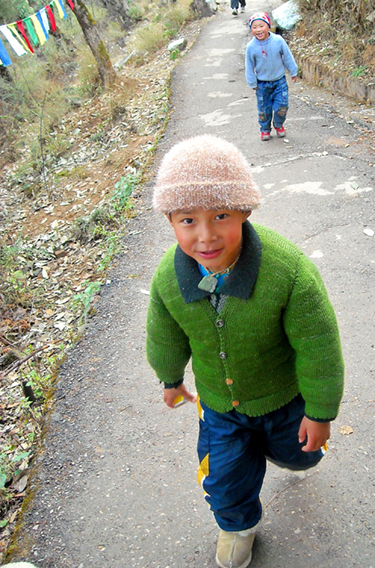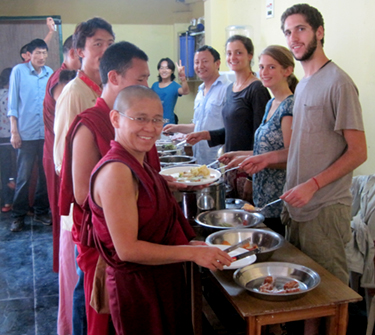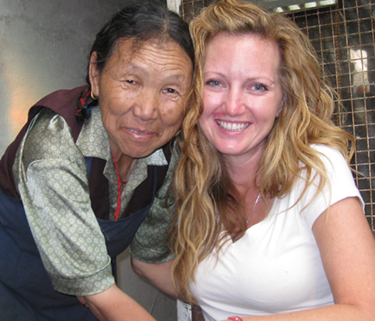Click HERE to donate to LHA Why Help Tibetans?
In 1949 China invaded and occupied Tibet, intending to erase Tibetan identity and the traditional way of life. As a result, more than a million Tibetans since that time have already died – victims of battle, hunger, executions and labor camps – while the abuses of individual human rights, and an institutionalized, systemic assault on the collective rights of Tibetan people continues. Tibetans who exercise internationally-recognized human rights and freedom of expression, such as keeping or displaying photos of the Dalai Lama, are arrested, tortured, and given long prison terms on charges like "disturbing national stability." See a historical overview for more details about the history of Tibet.
More than two-thirds the size of India, with major rivers feeding the rest of Asia, Tibet has become China’s gold mine and garbage dump. Prior to China’s invasion, every major river and lake in Tibet contained clean, drinkable water and now, only 70 years later, they are all polluted. 75% of Tibet’s forests have been clear-cut by the Chinese causing major environmental issues. Massive mining operations go on unregulated, with more devastating consequences for Tibet's environment. Nuclear waste produced in other parts of China is dumped in Tibet. See Tibet Environment for more information.
Many Tibetans fled their homeland by foot over the Himalayan mountains. They arrived in India seeking refuge from the horrors being inflicted upon their people, and their land. They face huge resettlement issues. Many need housing, healthcare, education, employment and more. Since 1997, LHA has worked to develop effective and affordable social service programs to address some of these needs. For details, see Projects in India.
For Them. For Us. For Everyone.
One reason why it’s so rewarding for LHA to help Tibetans is that we ourselves learn so much by working with such spiritually attuned, kind, and appreciative people. Nearly everyone who volunteers with LHA says at some point, "I feel like I received so much more than I gave.” Moreover, if the human race is to survive, we need the wisdom and practices richly expressed in Tibetan culture and philosophy. Generosity, tolerance, patience, joyfulness, compassion, loving kindness and all the other human qualities which move us in the direction of peace and non-violence are so well expressed and taught through the Tibetan people. It’s important and wise to make sure this precious light does not go out.
For more than 2,000 years, Tibetans have been learning and practicing, concentrating on matters of the mind and spirit. See Buddhism for an overview of Tibetan Buddhism. Traditionally, a full third of the Tibetan population became monks or nuns, to live and study together. This way of life is being outlawed. But what's been accumulated for centuries – irreplaceable cultural traditions, including parables and songs, artwork, crafts, philosophical and religious systems, practices and ideas – must be preserved. While we work to help Tibetan people, if we also value and study their culture, we gain access to an immense body of wisdom, ways of knowing and being in the world which may be more essential to humanity now than ever before, as global commerce and issues like climate change demand we work together. See Mindfulness and Neuroscience for a summary of scientific research studies on meditation.
Tibetan Wisdom Traditions, Tibetan Buddhism
As Westerners open up more and more to Buddhist practices and ideas, science dealing with the mind, like psychology and neuroscience, confirs Buddhist beliefs about the mind. Tibetan Buddhist traditions are based on the Buddha's teachings (in India) more than 2,500 years ago. Tibetans have used these teachings and developed practices to study the mind and human nature for more than 2,000 years. Prior to China’s invasion in 1949, monks and nuns made up one third of Tibet's population. The focus of the country was the study of the mind, to develop an understanding of how it works and to apply practices which free it from suffering and ignorance, from anger, jealousy, anxiety, and depression. Ignorance is considered the lack of proper understanding – the root cause of all suffering. Tibetan Buddhist psychology works to remove suffering from the root. For more info see Tibetan Buddhism.
Wise Selfish and Foolish Selfish
As many great teachers and traditions tell us, it’s important for humans to help others. This is abundantly in evidence to all of us on the LHA team. Contact with these incredible people and the Tibetan way of life has changed us, taught us, brought joy and perspectives we would otherwise never have known. The Dalai Lama, half jokingly, says, "there are two kinds of people – those who are wise selfish and those who are foolish selfish. We all want happiness and don’t want suffering. The foolish selfish are confused, and do those things that they think will make themselves happy without regard to others suffering. The wise selfish know that relieving the suffering of others will in return bring lasting happiness to themselves.” |

Thousands of children have been separated from their
families and smuggled out of Tibet in hopes that they may
live free from persecution and
receive a proper education.
LHA supports Tibetan Children's Village (TCV), which
provides housing and education to more than
15,000 children in India and Nepal. TCV is directed
by Jetsun Pema, the sister of HH the Dalai lama

Roughly 75 Tibetans eat free, healthy lunches each
day for 10 years at the Lha Charitable Trust soup kitchen.

This Tibetan nun is waiting to see a dentist thanks to
LHA's 'Tibetan Smiles' dental
program.

Many elderly refugees have been separated from their
families. By helping these incredible people LHA volunteers
benefit from their wisdom and life experiences. The Tibetan
Elder Assistance Program (TEAP) is dedicated to this work.
|

